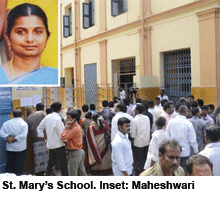The gruesome murder of school teacher R. Uma Maheshwari (41), who taught science and Hindi at St. Mary’s Anglo-Indian Higher Secondary School (a government-aided school established in 1845) in Chennai, by a 15-year-old class IX student of the school on February 9, has shocked and stunned the academic community, parents and students in Tamil Nadu (pop. 74 million), which prides itself as India’s most academically progressive state. The heinous crime which was widely covered by the television and print media has provoked a national debate on issues of parenting, teaching and student stress within a national school system which places high premium on examination success.
By all accounts, the student (whose name has been withheld as he is a minor) was angered by adverse remarks that his Hindi teacher had made in his school diary, repeatedly reprimanding him for his poor performance in class tests. The teacher had complained to the boy’s parents who had also admonished him. While Maheshwari, who had been teaching in St. Mary’s for six years was routinely doing her duty, the boy’s carefully planned murder has created consternation bordering on panic, within Chennai’s teachers’ community. According to students who witnessed the gruesome act, the delinquent sped ahead of the others into the classroom where Maheshwari was waiting to conduct a special class in Hindi, pulled out a knife and repeatedly stabbed her. The teacher succumbed to her injuries on the way to hospital.
 Police officials probing the crime have stated that the student had been carrying a knife in his bag for three days, waiting for an opportunity to attack his teacher when she was alone. Further inquiries about him have revealed he is from an affluent family, but a loner. When questioned, he admitted to being influenced by the Hindi movie Agneepath in which the protagonist takes revenge on his father’s murderers. The police have charged the student with murder and sent him to a juvenile home, pending inquiry into the murder which will be conducted by a juvenile justice board.
Police officials probing the crime have stated that the student had been carrying a knife in his bag for three days, waiting for an opportunity to attack his teacher when she was alone. Further inquiries about him have revealed he is from an affluent family, but a loner. When questioned, he admitted to being influenced by the Hindi movie Agneepath in which the protagonist takes revenge on his father’s murderers. The police have charged the student with murder and sent him to a juvenile home, pending inquiry into the murder which will be conducted by a juvenile justice board.
This violent incident of student angst and campus murder, hitherto dismissed as a typical Western phenomenon, has focused the attention of educators and the academic community on the multiplicity of challenges confronting teachers and parents while raising children who are beco-ming increasingly aggressive and intolerant of discipline. “Several factors including rising parental and faculty pressure to excel in academics, inadequate attention from working parents, dom-estic strife and peer pressure, explain this phenomenon. Our education system evaluates children purely on marks obtained in examinations, giving precious little weightage to their other talents and skills. At home, children spend hours watching films, television and playing violent video games, which glorify and romanticise graphic violence. Moreover total neglect of values-based education in most schools is also responsible for children’s inability to distinguish right from wrong,” says Magdalene Jeyarathnam, founder, Centre for Counselling, Chennai.
Given that contemporary children are exposed to an overload of information, and each generation is smarter than the previous one, parents and teachers need to focus on the missing element(s) as they discharge their roles in the 21st century. Educationists and child counselors are unanimous that sharp breaks from childcare traditions are required at home and in classrooms. “Parents have to lower their expectations of their children, and school heads and teachers should stop criticising and humiliating students in public. Teacher training and counseling also needs to be improved and contemporised. Teachers have to manage huge numbers of students in each class, and are often stressed by the pressure exerted by unreasonable school managements. School managements don’t invest sufficiently in in-service training and mentoring programmes for teachers. We have to bring professionalism into schools to ensure that society extends support to teachers,” says Mallika Mani, a reputed teacher trainer and director of Srikriti — the Teacher Education Centre, Chennai.
The shocking classroom assassination of an innocent, duty-driven teacher in Chennai will serve some purpose if it is a wake-up call for school managements in the state to review classroom conditions and pay greater attention to teacher training and welfare. There’s an urgent need for school managements, teachers and parents to acknowledge that education in the 21st century isn’t what it used to be.
Hemalatha Raghupathi (Chennai)